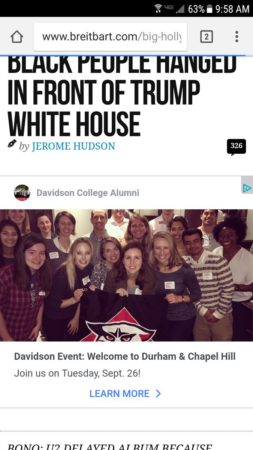In September 2017, a Davidson College alumna alerted the college via a tweet that the Davidson College Alumni Association was advertising on the alt-right website Breitbart.

The display of promotional material for Davidson College next to the ultra conservative and nativist rhetoric of Breitbart was not only a jarring juxtaposition, it was also completely inadvertent, an algorithmic outcome of Facebook’s advertising platform.
Journalists have recently exposed other disturbing elements of Facebook and Google’s ad networks, such as the explosive ProPublica report that advertisers on Facebook could deliberately reach anti-Semitic audiences using targeted keywords and demographic information from Facebook’s vast data mining operations. Buzzfeed similarly showed how racist advertisers could exploit Google’s ad network.
Clearly, online advertising intersects in compelling—but usually hidden—ways with concerns about justice, equality, and community. Justice, equality, and community (JEC)—these are concepts that define a new JEC graduation requirement at Davidson College. To satisfy this requirement, students must take at least one course that addresses “the manifestations of justice and equality in various communities, locales, nations or regions, and focus on methods and theories used to analyze, spotlight, or remedy instances of injustice and inequality.”
In Spring 2018 I am teaching one such JEC-designated course, Gender and Technology (DIG 340). This course counts toward both Digital Studies and Gender and Sexuality Studies major and minor requirements. Thanks to funding from Davidson’s momentous Justice, Equality, and Community grant from the Mellon Foundation, I am developing an assignment for DIG 340 that allows students to explore, critique, and undermine social media ad platforms.
Quite simply, the assignment is to subvert social media advertising by placing justice, equality, and community-oriented materials in timelines and websites whose users would normally not encounter that material. Imagine, for example, a sponsored ad about Colson Whitehead, Davidson’s 2018 Reynolds speaker, appearing on a white supremacist website. Or #metoo promoted posts showing up on the timelines of so-called Men’s Rights activists.
Working in groups of 3-4, students will manage a JEC-focused ad campaign of their own design on either Facebook, Twitter, or Google’s ad platforms. As students explore the contours, possibilities, and limits of social media advertising, each group will manage a series of campaigns with progressively larger budgets as they fine-tune their message and promotional strategy. Groups will have a budget of only $5 for their first campaigns. But as their campaigns grow more sophisticated, budgets will increase. Groups will have $100 for their final campaigns. All the while students will critically examine the advertising apparatuses themselves, analyzing overt and implicit ideological assumptions built into the platforms. Students will be aided in this process by Sara Wachter-Boettcher’s important new book, Technically Wrong: Sexist Apps, Biased Algorithms, and Other Threats of Toxic Tech (2017).
Our implementation of the assignment is a few months away, and I am eager to hear your ideas about it. Thoughts, comments, suggestions?